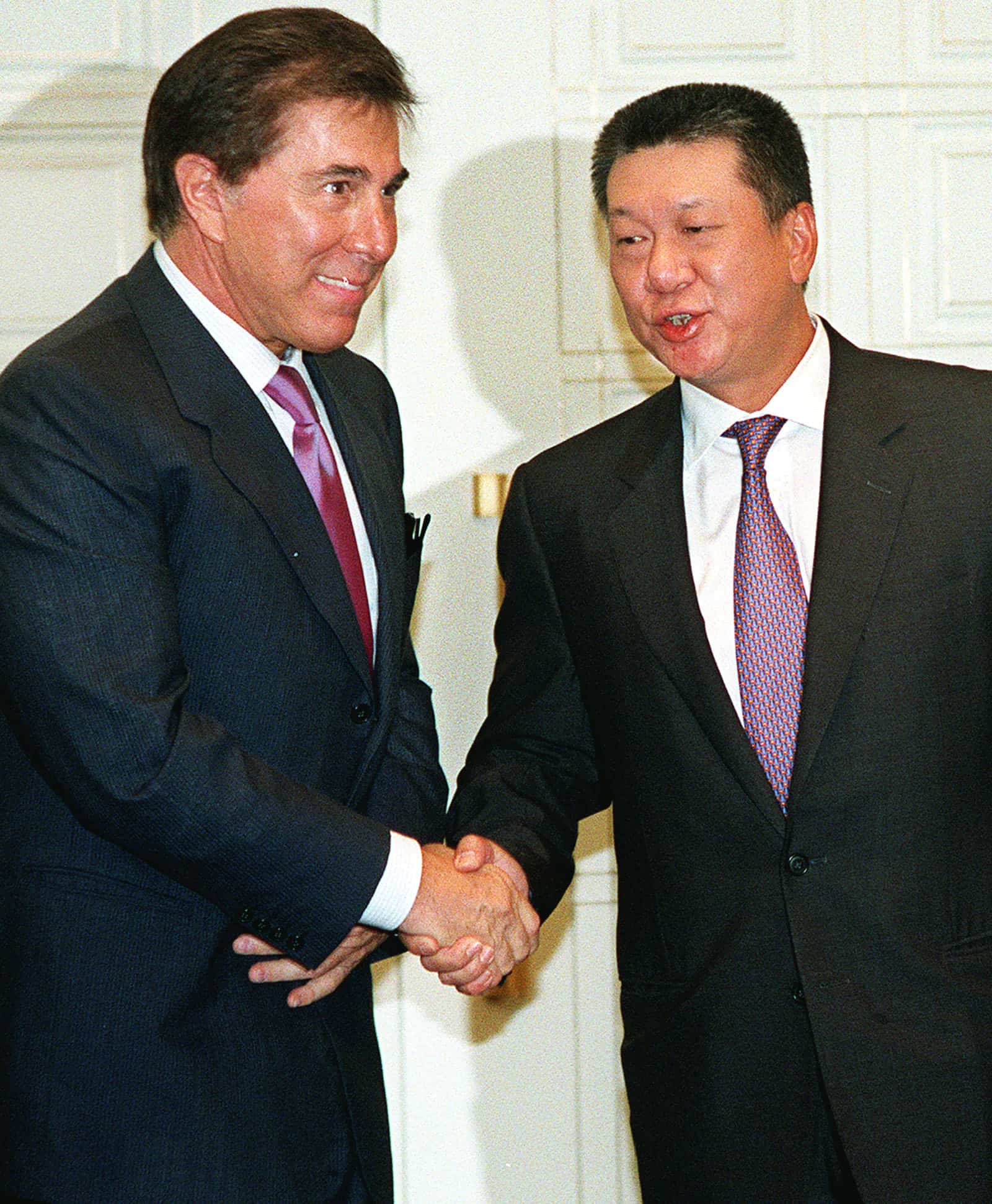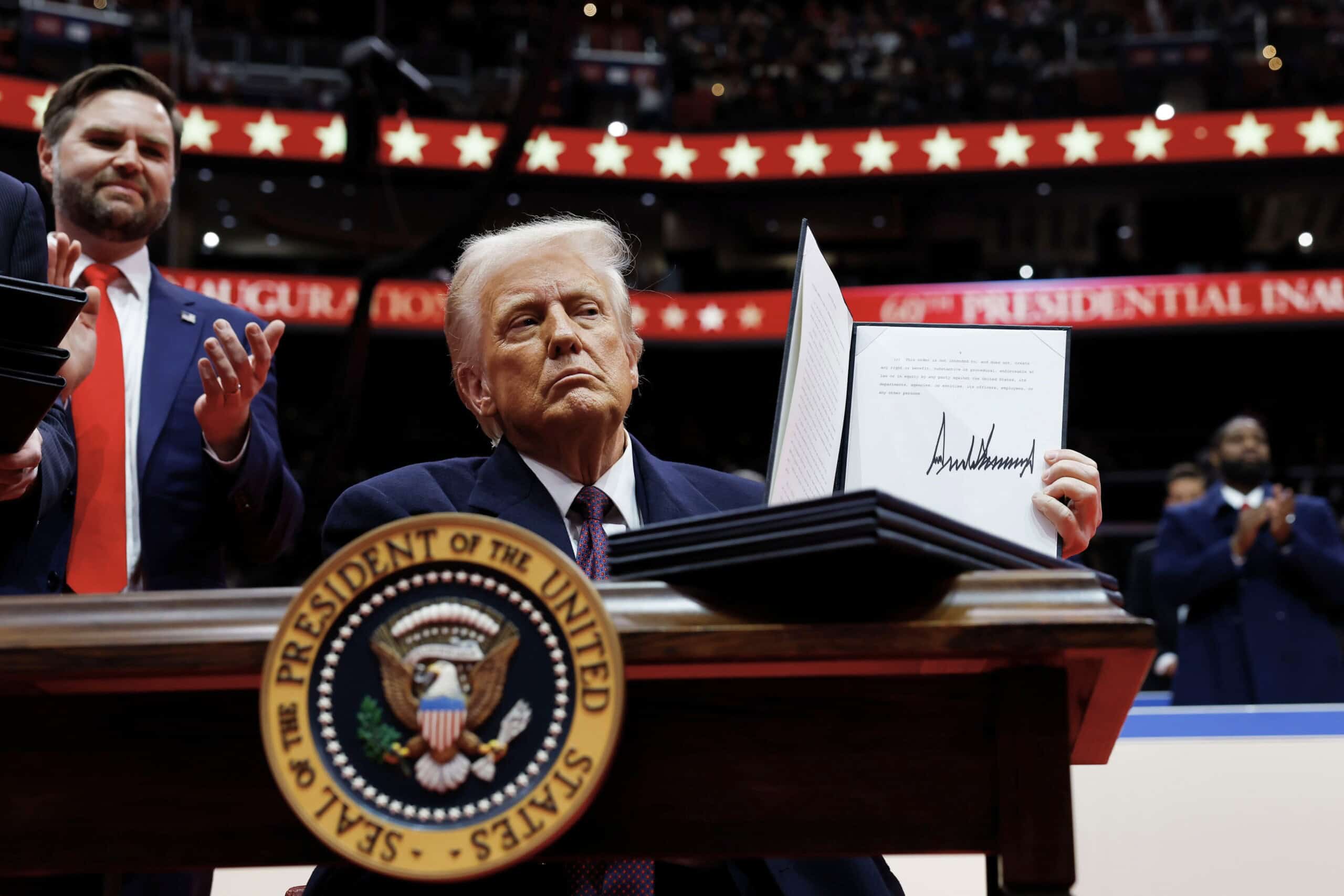
This is the first in a two-part series on how Wynn Resorts, one of the world’s biggest casino operators, pursued a deal to acquire land in Macau’s Cotai Strip from a pair of Chinese businessmen.
In many ways, Stephen A. Wynn is synonymous with Las Vegas. The larger-than-life casino mogul was key to remaking the Las Vegas Strip from an organized crime-controlled backwater into a modern, family-friendly entertainment destination in the 1980s, with properties that include the American casino icons like the Bellagio and Treasure Island. In the Ocean’s 11 movie and its sequels, the Vegas tycoon, Terry Benedict, is loosely based on Wynn.
But in a strange twist, the career and legacy of Steve Wynn — now 80 years old — may end up being defined by Macau, the Chinese gambling capital, and Wynn’s dealings with Beijing elite while doing business on the 12-square mile island.

In May, after the U.S. government sued Wynn to compel him to register as a foreign agent of the Chinese government,1Wynn, the DoJ alleged, was lobbying President Trump to extradite the exiled billionaire-turned-dissident Guo Wengui. evidence emerged of Wynn’s connection to a senior Beijing official. The Department of Justice argued that the official had leverage over Wynn due to “his desire to protect his business interests in the PRC.”
But this wasn’t the first time that Wynn had obscure relationships with people connected to the highest echelons of political power in China.
Records show that in 2012, a subsidiary of Wynn Resorts2Palo Real Estate is the firm that actually made the payment. It is an indirect wholly owned subsidiary of Wynn Macau, which is 72 percent owned by Wynn Resorts. made a $50 million payment to a firm linked to two mysterious businessmen — Ho Ho and Ho Hoi — in order to develop the $4 billion Wynn Palace on Macau’s Cotai Strip, which Wynn once called “the single most important project” in the company’s history. The deal attracted significant scrutiny at the time, and lawyers for Wynn Resorts told The Wire what they have said before: The Macau government had “earmarked” the plot of land for a company controlled by Ho Ho and the deal was necessary in order to gain access to the land.
No regulatory body has ever accused Wynn Resorts or its affiliates of any wrongdoing in the decade-old Cotai land deal. But The Wire’s four-month-long investigation has uncovered new evidence about Wynn’s partners, including the determination that Ho Ho and Ho Hoi were using aliases. The two men are brothers who grew up in Beijing and had multiple passports, deep ties to the Chinese military, offshore companies and indirect business connections to the relatives of China’s supreme leader, Xi Jinping.
We also found no indication that the Ho brothers had documented rights to the plot of land Wynn paid them for; and we determined that Ho Ho’s business partner in the original conception of the land deal was a longtime family friend and former business partner of Macau’s chief executive at the time, Edmund Ho.
While this investigation did not turn up proof of wrongdoing, the backgrounds of Ho Ho and Ho Hoi and their web of elite business connections (which are covered in Part Two of this series) raise questions, including about the due diligence performed by Wynn Resorts and its Macau subsidiary — both publicly traded companies — to ensure that its large payment to the Ho brothers’ firm did not run afoul of the Foreign Corrupt Practices Act (FCPA), which prohibits U.S. individuals and businesses from making payments, directly or indirectly, to foreign government officials to assist in obtaining or retaining business.

Wynn, who left his company in 2018 amid sexual misconduct allegations, declined to comment on the deal. But lawyers representing Wynn Resorts say there was nothing unusual3Wynn Resorts insists there was an informal earmarking system that was in place in Macau and Cotai during that time period, including with respect to other companies and parcels of land. about the Macau land deal and that it was properly vetted by the company’s internal counsel and outside law firms before any payment was made. The company declined to provide details about the result of the due diligence investigation, citing Macau privacy laws,4Wynn Resorts Macau says “it is prohibited by the Macau Personal Data Privacy Act from disclosing personal data outside of Macau. The Wynn organization cannot and will not violate Macau law by providing personal data to reporters.” and said that raising the issue now was likely the work of someone trying to damage the company’s reputation at a critical time: Just recently, Wynn Resorts Macau won a provisional license to continue operating on the island for the next 10 years, beginning in January.
“Wynn Macau followed the Macau Government’s process for applying for land, worked with counterparties who were represented by a respected international law firm, and was ultimately granted a land concession in 2012,” a spokesperson for Wynn Resorts told The Wire about the original license. “At no time has any governmental or regulatory agency anywhere suggested or found that Wynn Macau or Wynn Resorts had violated any regulation, law or policy in that effort.”
The deal with the Ho brothers has attracted intense scrutiny over the years, but The Wire is publishing the most detailed and comprehensive account yet of the origins of the Macau land deal and the people behind it. To confirm the identities of the Ho brothers, this publication reviewed scores of corporate records, land registries and court filings from Hong Kong, China and Macau. Our investigation also drew on access to the Panama Papers — which were shared by the International Consortium of Investigative Journalists and Süddeutsche Zeitung — to review identity cards and other documents.
…the story of how these two enigmatic brothers went from a Beijing military family to Wynn’s business partners also shows how the intersection of money and power in Macau can reverberate far beyond a tiny island in China’s shadow.
In doing so, we have reconstructed a business alliance that sheds light on the often impenetrable universe of high stakes dealmaking in Macau, one of the world’s biggest gambling hubs. In the past two decades, Macau, which became a Chinese “special administrative region” in 1999, has been rocked by scandals involving bribery, corruption and links to organized crime. Experts say seeing through the city’s veneer and doing background checks on Macau’s businesspeople — who often hail from nearby mainland China and Hong Kong — has long been difficult, even for multinational corporations like Wynn Resorts.
“In China, politics and money interact in these very shadowy and difficult-to-see ways that make connections hard to follow,” says Orville Schell, the Arthur Ross Director of the Center on U.S.-China Relations at the Asia Society. In general, when political elites do business, he says, “money goes through several occluding membranes.”
The Wire found no evidence that Wynn Resorts’ $50 million went to a Chinese political figure or a politician’s family member. But the circumstances surrounding the deal underscore the difficulty of tracking and fully understanding American business decisions in China, and at the same time highlight the outsize importance of Macau to Wynn’s company. As Wynn himself put it in 2014, “We are primarily a Chinese company.”
This context is also critical for understanding Wynn’s recent dispute with the Department of Justice, which was dismissed in October.5A federal judge dismissed the case, saying he was not making a judgement about whether Wynn had acted as a foreign agent, but that the DoJ couldn’t compel him to register as a foreign agent now for actions that took place in 2017. Lawyers for Steve Wynn said the dismissal was a “victory” for Wynn and that he “was never an agent of China, and, moreover, he never lobbied the government about [Guo Wengui]. Mr. Wynn brought the PRC’s concerns about Mr. Guo to the attention of the administration for its situational awareness.” In 2017, when the senior Beijing official was asking for Wynn’s help with President Donald Trump, more than 70 percent of Wynn Resorts’ revenues were coming from its two casinos in Macau. As the then-finance chairman of the Republican National Committee, Wynn was extremely influential in U.S. politics, yet the concession process in Macau meant his fortunes could turn on a dime with “an easy yes or no” from Beijing, says Isaac Stone Fish, the founder of Strategy Risks, a China-focused corporate risk firm. “The Chinese government can say no and torpedo your business, or say yes and give your company a massive opportunity,” he says.

Indeed, Wynn Resorts thrived in Macau: In the decade after 2002, when Wynn was first awarded a concession, Macau’s gross gaming revenues surged by more than 1,000 percent. But the story of how these two enigmatic brothers went from a Beijing military family to Wynn’s business partners also shows how money and power intersect on a tiny island in China’s shadow.
THE COTAI RUSH
In 2005, Wynn Resorts was falling behind in Macau.

AP Photo/John Locher
Las Vegas Sands (LVS), the company founded by Sheldon Adelson, who was Wynn’s major competitor, was spearheading the effort to develop the Cotai Strip — a reclaimed sandy isthmus that was connected to the main island by bridges.
Adelson envisioned Cotai as the Las Vegas Strip of Asia. Compared to downtown Macau’s cramped alleyways, the area provided space for large resorts, and in 2003, LVS announced plans to develop a massive casino resort in Cotai styled after the Venetian in Las Vegas, complete with canals and gondoliers.
“Adelson said, ‘This is going to be great,’” says a Macau gaming lawyer who previously advised the government. “Nobody else wanted to touch the area — it was literally a junkyard. You would drop your very old car in that area.”
Initially, Wynn also seemed skeptical. At the time, he was developing a luxurious casino in downtown Macau, which analysts say was focused on catering to VIPs rather than mass market customers. As he famously said, “Bigger is not better. Better is better.”

The Ivy League-educated chief executive officer was known for helping transform the Las Vegas Strip into a destination for fine dining and entertainment. And, in 2002, when the government opened up Hong Kong-born entrepreneur Stanley Ho’s casino monopoly in Macau to other companies, Wynn had made the pitch that he could do the same for Macau.
António Lobo Vilela, who was a senior legal adviser on the first casino tender commission and is now a gaming lawyer in Macau, remembers Wynn giving his presentation to Macau officials and silence falling in the room. “[Steve Wynn] is charming,” he says. “He can take an audience to fly with him. The way he was presenting, he was showing the moon, and we were seeing the moon.”
Wynn Resorts, through a Macau subsidiary, was the first foreign company to receive a license to operate casinos in Macau after its historic opening, but others soon followed, including LVS, which moved faster than Wynn and opened its downtown casino in 2004 — two full years before Wynn.


Macau’s high rollers — who were mostly from mainland China, where gambling is illegal — were worth the rush. In 2006, Macau surpassed Las Vegas’ gambling revenues, a previously unimaginable feat. And in 2008, the Las Vegas Sands in Macau made $3 billion in revenue, compared to Wynn’s $1.9 billion. As the center of gravity for the gambling industry shifted increasingly to Macau, it became clear that the development of Cotai was going to be key to success. And Wynn couldn’t let Adelson leave him in the dust once again.
“I came to Cotai late,” Wynn said in an interview with the magazine Macau Business in 2012. He went on to describe how as a concessionaire, he started asking the Macau government “for consideration to acquire land in Cotai for future use.”
Wynn Macau approached Edmund Ho, who was then Macau’s chief executive — the island’s highest ranking official — and in charge of Cotai land allocation, to discuss plots of land.6In an interview in The Wall Street Journal, Wynn says he “bugged” the Macau Chief Executive about a plot of land. (The Wire found no family relationship between Edmund Ho and Ho Ho.)

Wynn had worked hard to cultivate a personal relationship with Ho. According to a leaked diplomatic cable about Adelson and Wynn’s outreach to Macau and mainland officials, Wynn paid particular attention to the relationship and arranged “to meet privately with Macau’s chief executive during each of his quarterly visits to Macau.”7In a letter to the Department of Justice, revealed in the recent foreign agent case, Wynn’s lawyers also explain that he “dealt extensively and had a good working relationship with Macau’s former Chief Executive Edmund Ho.”
Edmund Ho informed the company that there was a plot of land that had already been earmarked for Chinese Entertainment and Investment Company (CEIC), a firm controlled by Ho Ho, to develop a “Taiwan House”8Wynn Resorts said this project was supposed to cater to Taiwanese visitors and act as a “guest house” or themed entertainment project. project, according to Wynn Resorts. The Macau chief executive, the company says, “suggested that if Wynn Macau wanted to develop that land, it would have to partner with those other developers.”
Wynn Resorts says it subsequently performed “extensive due diligence” on the individuals and companies involved. “This whole business of the Foreign Corrupt Practices Act — we were schooled in this,” Wynn told The Wall Street Journal in 2012. “Right away we started checking everybody with Mr. Ho Ho, and everybody came up dandy. … Edmund told me they are upstanding people from Beijing families.”
Edmund Ho, who served as Macau’s chief executive from 1999 to 2009, did not respond to requests for comment. He reportedly provided Ho Ho’s phone number to a Wynn staff member so that they could give him a call.
The result of that call, for both Wynn and Ho Ho, turned out to be fruitful.
‘NOBODY KNOWS WHO THEY ARE’
From the very beginning, the details of Wynn’s Cotai land deal were hard to follow.
The deal was originally conceived9In a lawsuit with Wynn, Kazuo Okada, Wynn Resorts co-founder, shared documents related to the Cotai land deal. Although Okada said in filings that these documents were shared with him independently from his role as director and he could not confirm them, Wynn Resorts statements to The Wire confirm most of their contents. in 2005, and it consisted of a joint venture between a Wynn Macau subsidiary and CEIC, which was 90 percent owned by Ho Ho. The remaining 10 percent of the company was held by Cliff Cheong, a Macau businessman who also happened to be involved in the Las Vegas Sands (LVS) bid to obtain its Macau license. According to a sealed deposition in a U.S. court case related to Cheong’s role with LVS, Cheong was a “very close” friend and former business partner of Edmund Ho.10Cheong was also a member, alongside Edmund Ho, of the preparatory committee set up by the Chinese government ahead of Macau’s 1999 handover to China. And Cheong’s brother acted as a personal representative for Edmund Ho while he was serving as chief executive, often meeting with him five times a week.11The case with LVS, which Cheong filed alongside two other partners, was settled out of court with LVS paying the men $42 million.
In the 2012 Wall Street Journal interview, Wynn said he didn’t know who Cheong was, and Wynn Resorts told The Wire that it could not confirm Cheong’s relationship with the chief executive.
“The Company’s background checks of Messrs. Ho-Ho and Ho-Hoi did not reveal any connections to the Chinese government or relationships with governmental officials, or any information that would prevent the Company from engaging in the transaction,” lawyers for Wynn Resorts said. “In 2005, the Company was unaware that Cliff Cheong was a business partner of any government official. The Company has never provided payment or anything of value to Cliff Cheong.”
The Wire reached Cheong by phone.12Cliff Cheong is also known as Jose Cheong Vai-chi. He says he was introduced to Ho Ho through a friend in Macau, though he can’t recall who. He also says that he had no knowledge or involvement in the deal with Wynn Macau and that he did not know anything about a Taiwan House project.
Under the terms of the original 2005 agreement with a Wynn subsidiary, CEIC would receive a 12.5 percent stake in the joint venture — which would develop two resorts on the 54-acre plot in Cotai, including the Taiwan House — and it would receive a $35 million finder’s fee once the land rights were granted to the joint venture.

In 2006, however, Ho Ho’s company designated another company, Tien Chiao Entertainment and Investment Company Limited, to enter into the joint venture, and in 2008, a Wynn Macau subsidiary agreed to buy out Tien Chiao from the project to build on a smaller but overlapping plot of land.13Wynn Resorts says the new deal allowed Tien Chiao to go ahead and use part of the land for the “Taiwan House.” A Wynn Macau subsidiary agreed to pay the company $50 million dollars “in consideration of [Tien Chiao Entertainment’s] relinquishment of certain rights with respect to its business interests in the potential Cotai project,” according to a 2009 Wynn filing.14Wynn Resorts was listed on Nasdaq in 2002, and in 2009, Wynn raised $1.63 billion in a Hong Kong IPO for its Macau unit.
An important distinction is that this payment was a “finder’s fee” and “buyout” but not a payment for the land itself — a Wynn Resorts subsidiary paid a separate $193.43 million (and an additional yearly rent) to the Macau government for its land in Cotai.15Wynn Resorts’ neighbor in Cotai, MGM, paid a similar amount (around $161 million) for its land. Wynn Resorts told The Wire that MGM China, a division of MGM Resorts, ended up building on the portion of the land that was earmarked for Ho Ho’s company but ultimately not used by Wynn. A MGM spokesperson told The Wire that it had no dealings with Ho Ho, CEIC or Tien Chiao.
The $50 million payment by a Wynn subsidiary went to Tien Chiao, which was 76 percent owned by a man named Ho Hoi, according to Macau corporate records reviewed by The Wire. The remaining 24 percent was held by a man from mainland China named Zhang Luchuan. Although Ho Ho was not a shareholder of Tien Chiao, in the documents for the agreements with Wynn, it was Ho Ho — not Ho Hoi — who signed his name next to Steve Wynn’s. Wynn Resorts did not comment on Ho Ho’s role at Tien Chiao but confirmed that the owners of Tien Chiao appointed Ho Ho to act on behalf of the company.
Nobody knows who they are — they surfaced in the land deal. That is a very sensitive issue in Macau. The deal was cut and they disappeared.
an anonymous Hong Kong-based gaming analyst
The identities and backgrounds of the three men were a mystery to the business community in Macau, a small island of 500,000 residents back then. Ho Ho, according to corporate records, received a Macau ID in 2001, just four or so years before Edmund Ho told Wynn representatives to give him a call.
“Nobody knows who they are — they surfaced in the land deal,” says a Hong Kong-based gaming analyst who asked to remain anonymous due to political considerations. “That is a very sensitive issue in Macau. The deal was cut and they disappeared.”

Although the deal was finalized in 2008, the Macau government did not approve the development until 2012, at which point Wynn finally delivered the $50 million payment and broke ground on the Wynn Palace. But still, people on the island and elsewhere had questions.
Kazuo Okada, a co-founder of Wynn Resorts and board member who was in a legal battle with Wynn after the company attempted to push him out, wrote to the other board members in 2013 saying, “Ho Ho is a mysterious person who neither Macau insiders nor the press have yet been able to identify… To the best of my knowledge and recollection, Mr. Wynn’s relationship with Ho Ho has never been disclosed to or discussed at any meeting of the Board.”

Okada’s representatives declined The Wire’s requests for comment about the deal. Wynn Resorts lawyers, meanwhile, note that Okada’s allegations only came after Wynn Resorts investigated “concerns that Mr. Okada was bribing officials in the Philippines in order to secure a gaming license and, based upon the results of that investigation, ultimately voted to forcibly redeem Mr. Okada’s shares.”
Still, journalists in Hong Kong and Macau could not track Ho Ho or Ho Hoi down, and no one from Tien Chiao made any public statements about their involvement in the deal. The Taiwan House project also never came to pass.
When the U.S. Securities and Exchange Commission sent a letter to Wynn Resorts in 2013 asking how the company was accounting for the payment, Wynn Resorts responded that it was made to “a Macau incorporated unrelated third party company in exchange for its release of certain rights in and to any future development” on the Cotai plot.

After receiving inquiries about Tien Chiao’s rights to the plot, the Macau Land, Public Works and Transport Bureau put out a public statement in 2014 saying that there was no information on Tien Chiao in the land file. The International Union of Operating Engineers, an American union representing casino workers, requested and received the full land concession file for Wynn’s Cotai plot16The union also started a website, which has since been taken down, documenting its extensive research into the deal, including the theory that Ho Ho and Ho Hoi were using aliases., and the file, which The Wire obtained, includes hundreds of pages of documentation but no mention of CEIC or Tien Chiao’s prior rights to the land. In fact, it shows that the first entry was a request from a Wynn executive in 2006, after the first agreement between Ho Ho and Wynn. The Land Bureau did not respond to The Wire’s requests for comment.
Lawyers for Wynn Resorts told The Wire that “This process of informally ‘earmarking’ land to developers was not unique to Wynn Macau.”
“The voluminous documentation and recordkeeping in this Cotai land file, dating back to the mid-2000s, shows that the government did indeed document this land-granting process in great detail,” Jeffrey Fiedler, the union representative at the time, told the Macau Daily Times in 2015. “However, the glaring omission in these Cotai land documents is any reference to the Macau government committing land rights to businessman Ho Ho prior to 2006. Why would the government document seemingly everything concerning this land in Cotai except this critical and valuable earmark to Ho Ho and his associates?”
THREE INVESTIGATIONS, AN INQUIRY AND A LAWSUIT

When the Wynn Palace finally opened its doors in August 2016 — more than a decade after Wynn first conceived of it — it was not without its controversy. During construction of the five-star property, which is home to 14 restaurants, 28 floors and an artificial “performance lake,” Wynn saw both his character and his company questioned.
Most of the scrutiny focused on a donation that Wynn Resorts made while it was waiting for the Cotai development to be approved by the Macau government. In 2011, Wynn Macau committed to donate $135 million dollars over a ten year period to the University of Macau Development Foundation (UMDF), an organization set up to financially support the public university. The chancellor of the university at the time was also Macau’s chief executive, Fernando Chui Sai-on, and the chair of UMDF is a senior adviser to the Macau government. UMDF did not respond to The Wire’s request for comment.

As part of his broader legal battle, Okada, Wynn’s co-founder, alleged that the donation was inappropriate. As Okada said at the time, “I am at a complete loss as to the business justification for the donation, other than that it was an attempt to curry favor with those that have ultimate authority for issuing gaming licenses.” Okada also raised questions about the Cotai land deal, but the litigation was settled in 2018, with Wynn Resorts agreeing to pay Okada’s company $2.6 billion for the value of the Wynn’s shares that were forcibly redeemed.17Okada had been ousted from his company in 2017, so he was not a party to the settlement.
Lawyers for Wynn Resorts told The Wire there was nothing inappropriate about the donation and that the company “has a long history of donating money to charities and schools in the communities in which the Company operates.”18For example, in 2006, the company spent $10 million on a Ming dynasty vase and donated it to the Macau Museum.
The Nevada Gaming Control Board (NGCB), Department of Justice, and the SEC all looked into the donation, but none of the regulatory bodies ever found any wrongdoing.

In 2014, the Macau Commission against Corruption (CCAC) announced that it was investigating the Cotai land deal. Until 2018, Wynn disclosed in its filings that CCAC had requested “certain information related to its land in the Cotai area.” But the commission never announced that the case was closed and also never published any results.
“The CCAC has never charged Wynn Resorts or any of its affiliates with any wrongdoing whatsoever and therefore we understand that no type of formal closure procedure would apply,” lawyers for Wynn Resorts told The Wire. “As we stated in our public disclosure over eight years ago, we complied with requests for documents.” Wynn Resorts added that it was not the subject of the investigation but due to constraints around disclosing the actions of regulators, declined to reveal who or what was the focus on the inquiry.
The NGCB, DOJ, CCAC and the SEC declined The Wire’s request for comment.
[Macau] was the spark plug where foreign money and Chinese political power could intersect without tremendous scrutiny. It was a nether region — a free fire zone in between jurisdictions.
Orville Schell, the Arthur Ross Director of the Center on U.S.-China Relations
Wynn, in his usual unflappable manner, never seemed too worried about any of these inquiries. In an unrelated hearing in front of the Massachusetts Gaming Commission in 2013, he explained his rationale for the large university donation.
“I recognized that in order to be successful, we just couldn’t be an American company in Macau. We had to be part of the community,” he said.

On the Cotai land deal, Wynn has also denied anything disreputable. In the interview with Macau Business from 2012, Wynn seemed to acknowledge that Ho Ho’s companies didn’t have rights to the land on paper, but he argued that was par for the course at the time in Macau. “Nothing was on paper for anybody,” he said.
And responding to suggestions that Ho Ho and his associates could be affiliated with government officials, Wynn said: “We vetted the people in the group. We did investigations. We had them sign papers that nobody was involved with any governments.”19Lawyers for Wynn Resorts told The Wire, and The Wire confirmed independently, that the final deal “contained representations disclaiming any violations of anti-bribery laws and the Foreign Corrupt Practices Act.”
But after that vetting, the company has never, to this day, released Ho Ho and Ho Hoi’s other names and the fact that they were from an elite military family with ties to the highest levels of Chinese politics. That ‘nothing was on paper,’ experts say, may have been precisely the point.
Back then, Macau “was the spark plug where foreign money and Chinese political power could intersect without tremendous scrutiny,” says Schell of the Asia Society. “It was a nether region — a free fire zone in between jurisdictions.”
The kind of place, in other words, where two well-connected brothers from Beijing might go to make their fortunes.
Read here the second and final installment of this series, which reveals the Ho brothers’ original names and documents their elite backgrounds and unusual business connections.

Katrina Northrop is a journalist based in Washington D.C. Her work has been published in The New York Times, The Atlantic, The Providence Journal, and SupChina. @NorthropKatrina




